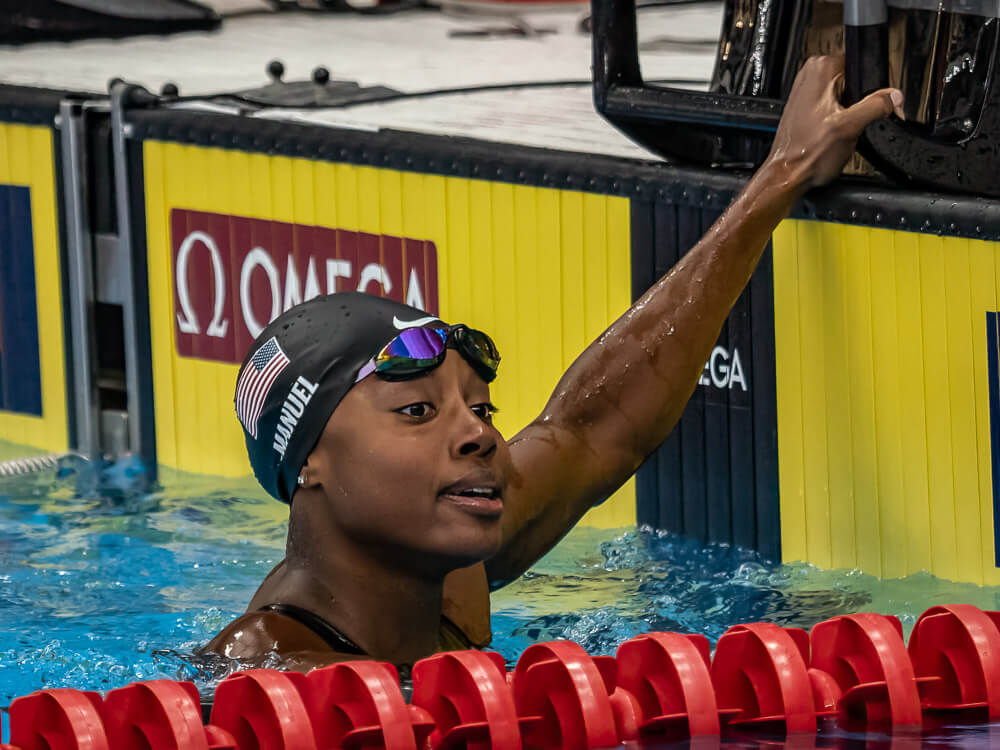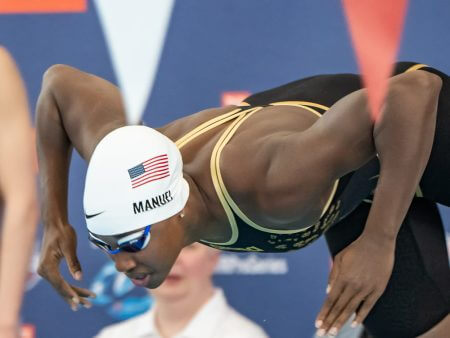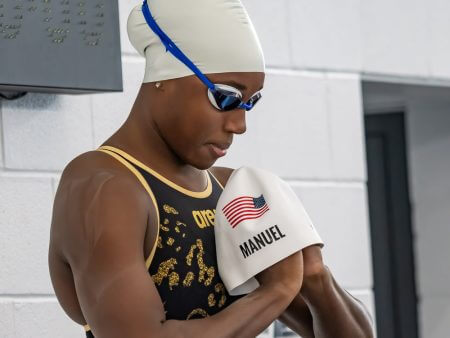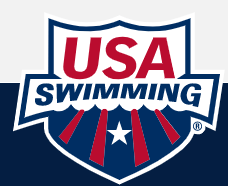Simone Manuel Set For Final Test of Her Comeback at United States Olympic Trials

Simone Manuel Set For Final Test of Her Comeback at Olympic Trials
Five-time Olympic medalist (two gold, two silver, one bronze) Simone Manuel revealed at the U.S. Olympic Trials in 2021 that she was battling overtraining syndrome, which had taken a huge toll on her physically and mentally. After staying away from elite-level competition for nearly 19 months since the end of the Tokyo Olympics, she has continued to make steady progress and will compete in her fourth Trials, vying for her third Olympic team.
Halfway through the last Olympic Trials in 2021, Simone Manuel fought back tears as she spoke to reporters inside the CHI Health Center, sitting a short distance away from the pool where she had just placed ninth in the 100 freestyle semifinals. She was the defending Olympic gold medalist in the 100 free and two-time reigning world champion in the event, but she was more than two seconds off her own American record (52.04), as her Tokyo hopes in the event were dashed.
That Thursday evening, Manuel revealed that she had been diagnosed with overtraining syndrome and had missed significant training time as she prioritized rest and recovery. She knew that whether or not she made the Olympic team, she would not return to full health until taking a multi-month break from swimming altogether. But Manuel promised to keep battling, to continue to give maximum effort as long as she still had a chance.
Indeed, Manuel took the next day off from racing before returning to race the 50 free. And in the final women’s race of the Trials, Manuel got the job done, closing strong to take the win by one hundredth of a second and clinch her Olympic spot. Immediately, longtime rival Abbey Weitzeil, who finished second by the narrowest of margins, joyfully dashed across the lane line to embrace Manuel. Manuel ended up going to Tokyo and placing 11th in the 50 free, and after her addition to the U.S. women’s 400 free relay, she also earned a bronze medal.
After that, though, Manuel had to prioritize herself. Most importantly, she had to take time to reclaim her physical health.
From the beginning, she maintained the notion that she would one day return to swimming, but doing so would require a comprehensive re-evaluation and re-examination. As the first African American woman to capture individual Olympic gold and a trailblazer for representation in the sport, Manuel had inspired so many, but also felt the weight of her status in the sport. A new balance would be essential before Manuel could try to return to sprinting prominence.
THE JOURNEY BACK
The journey back to swimming began in January 2022, when Manuel’s doctor cleared her to begin venturing back into the pool. Following Tokyo, they had agreed that her hiatus must stretch at least until the following calendar year to fully escape the effects of overtraining syndrome, and at her follow-up appointment, doctors saw enough in Manuel’s physical recovery and emotional well-being to give her the go-ahead.
Not long after, Manuel made the decision to move to Tempe, Ariz., and restart her career under the guidance of Bob Bowman and sprint coach Herbie Behm.
“I had a list of several coaches who I wanted to reach out to, just based off their résumés, what they have accomplished in the sport, what I felt like I needed in a coach, and if they could get me there both in and out of the pool,” Manuel said. “That ultimately is what led me to (Bowman). I talked to several coaches. I basically did recruiting, but I was the one recruiting. I got opinions from a couple other people on where they thought could be a good fit for me.”

Simone Manuel — Photo Courtesy: Peter H. Bick
Still living in California, Manuel began swimming on her own at a local fitness center. Manuel and Bowman agreed that her build-up would be gradual to avoid a recurrence of the overtraining syndrome. Bowman wrote workouts for Manuel, but she would only swim Monday, Wednesday and Friday while lifting Tuesday, Thursday and Saturday “to give my body as much of a chance to recover as possible by only having it work out once a day.”
Once arriving at Arizona State, Manuel started with only single workouts before adding one double, then two doubles and finally three. “We kind of wanted to feel like we mastered the workload I was given at that given time before we ramped up and added an extra practice,” Manuel said, but even then, adding an additional workout into her schedule made her anxious.
Meanwhile, Manuel found that her initial training times did not match what she had achieved during her finest years. Of course, getting back to American-record-setting and world-title-winning times is no easy feat, but the process severely tested Manuel’s patience.
“I could do a similar set that I had done in the past, but the results were not even going to be anywhere near that. I think it was really hard for me not to compare myself to what I had done or what I had performed well in at practice or even in competition, but to focus on where I am now,” Manuel said. “That’s just a really hard mental tug-of-war when you know you’re capable of better, but in the moment, your body is not capable of better.”
But day after day, week after week, Manuel pushed through the challenging practices. In June 2023, 10 months after moving to Arizona, she opted not to contend for a spot on the World Championships team, choosing instead to race later in the summer as she prioritized extra training time with the goal of the Paris Olympics crystalized in her mind. By late July, Manuel’s times were still far from her best—even behind the marks she recorded in her compromised state in 2021—but over the next few months, glimpses of the once-dominant Manuel began to shine through.
REPRESENTATION FOR BLACK SWIMMERS
In 2016 at Rio de Janeiro, when Manuel became the first American to win Olympic gold in the 100 free in 32 years (Nancy Hogshead and Carrie Steinseifer tied for first in 1984), she became an icon in a sport where African American standouts are so few. Just over one year earlier, Manuel had been a part of the first NCAA swimming final where Black swimmers filled out the entire podium, with Manuel and Stanford teammate Lia Neal going 1-2 and Florida’s Natalie Hinds placing third. Now, with this win on the biggest stage, Manuel provided representation for Black swimmers around the country and around the world. That representation helped young swimmers believe that competing at the sport’s highest levels was a realistic goal.
Providing representation matters to Manuel, but her standing in the sport also created something of a burden. The pressure was internal, but Manuel still felt it, as if her results in swimming meant so much to such a big community that she could not let them down. However, in recent years, the 27-year-old believes she has matured in her self-talk, focusing on swimming and achieving for more personal reasons.
“I have felt at times that I wasn’t swimming all the time for myself. I do understand that what I do and the accomplishments that I’ve had in the sport have had an impact on a lot of people, but specifically the Black community. I think it’s really unfair for me to feel like I always have to carry that weight,” Manuel said.
“I think taking some time away from the sport and understanding my emotions and taking a break really allowed me to reframe how I wanted to approach swimming. I really wanted to approach it for me. It’s not for anybody else. It’s not to please anybody else’s expectations or even doubts in me. Of course, I want to inspire my community, but I don’t need to feel like it’s the end-all, be-all.”
Reaching that point, Manuel said, took time, with deep conversations with close friends and family plus extensive sessions with her sports psychologist focusing on “the trauma the sport has brought me.” Now, Manuel feels the position is one of balance, understanding that she has brought joy to so many around the world, but using those perceptions only as a lift and not a weight, and remaining genuine to herself.
“When you get uplifted like that, you want to make them proud, but it is a lot of pressure,” Manuel said. “The people who love me and the people who care for me and the cheerleaders that I don’t really know personally and don’t know me personally, they’ll be proud of me regardless, because I went out there and I was me.”
FOURTH U.S. OLYMPIC TRIALS
Now, Manuel is in the final weeks before she competes in her fourth Olympic Trials, and her hopes of qualifying for a third Olympic team have become more realistic with each passing meet. In the 50 free, she has progressed from 24.82 in January to 24.49 in March, and then a mark of 24.34 at the final stop of the TYR Pro Swim Series in San Antonio in April. Same story in the 100 free, where Manuel got down to 53.25 in San Antonio, and she has also clocked 1:57s in the 200 free on multiple occasions this season.
Simply, those times are good. Elite. Faster than Manuel has ever recorded at a non-taper meet, even quicker than she went early in those world-title-winning seasons.
“I’m faster at this point in the season than I ever have been, which is hopefully a good sign for taper,” she said. “ It’s surprising, but also, it’s not. I really put in a lot of work last year. I just unfortunately didn’t see the results. For me and Bob, I needed to be patient, and the results — at some point — would hopefully show up. And they did! So when I saw them, it was something I was really excited about, but it wasn’t something that I was shocked about because I had to put in a year-plus of hard work, hoping to see it come to fruition.”

Simone Manuel — Photo Courtesy: Peter H. Bick
Her buildup to Trials became a bit more complex when Bowman departed Arizona State to become the men’s head coach at the University of Texas while Behm was promoted to head coach of the Sun Devils. Manuel opted to balance blocks of sprint-focused work under Behm in Tempe with an altitude training camp under Bowman’s watch for more endurance-oriented work.
At Trials, Manuel will race the 200 free, 100 free and 50 free—in that order—and she will face the strongest field of sprinters the United States has assembled since 2013, Manuel’s first year on the senior-level national team and the last time an American women’s 400 free relay defeated a full-strength Australian squad. The group of sprinters includes veterans such as Weitzeil and Olivia Smoliga — swimmers who were teenagers on the 2021 Olympic team — and Torri Huske, Kate Douglass and the emergent Gretchen Walsh, who broke Manuel’s American record in the 100 yard free at the NCAA Championships in March.
With six swimmers likely to make the team in both the 100 and 200 free for relay purposes, Manuel will have plenty of chances to earn a ticket to Paris if she can make only marginal improvements from her in-season times, but she sees the situation differently.
“I don’t limit my goals,” she said. “I want to make the team in as many events as I possibly can, which would be the 200, 100 and 50. Nobody thought I was going to make the team in the 50 free in 2021, and I did.”
PERSISTENCE AND DEDICATION
Even with a résumé including five Olympic medals and 16 podium finishes at the World Championships, Manuel considers this most recent chapter in her career the accomplishment of which she is most proud. The persistence and dedication required to return to the top level of sprinting has been mentally exhausting, but also validating.
“There were times when I was like, ‘I don’t know why I’m doing this. I’m swimming in the B-final. I can’t remember the last time I’ve been in the B-final. I’m not dropping any time. What am I doing?’” Manuel said. “I think that continuing to stay the course and believe in myself is something I’m really proud of because just through this experience, you really see who a person is when they go through hardship. You really can see someone’s character, and I feel like I’ve learned so much about myself and what I’m capable of through this experience.”
Manuel is careful to remember that she will not let her own self-worth depend on qualification for Paris, but the achievement of going to a third Olympics would be quite sweet. Her thoughts turned to her husband, Denzel Franklin, and the sacrifice he made by leaving behind his job in California to accompany Manuel to Arizona.
“I don’t want it to just ride on that because I feel like at the end of the day, I’m really proud,” Manuel said. “I think it will feel really nice to make the third Olympic team and really feel like everything that I went through and all the choices and the sacrifices that I made were worth it.”
More Olympic Trials Coverage
- Meet Page
- More Information
- Psych Sheet
- Day One Preview
- Day Two Preview
- Day Three Preview
- Day Four Preview
- Day Five Preview
- Day Six Preview
- Day Seven Preview
- Day Eight Preview
- Day Nine Preview

- PSYCH SHEET
- HOTEL INFORMATION
- LIVE RESULTS
- MEET INFO
- TV SCHEDULE
- DAY 1 PRELIMS RESULTS
- DAY 1 FINALS RESULTS
- DAY 2 PRELIMS RESULTS
- DAY 2 FINALS RESULTS
- DAY 3 PRELIMS RESULTS
- DAY 3 FINALS RESULTS
- DAY 4 PRELIMS RESULTS
- DAY 4 FINALS RESULTS
- DAY 5 PRELIMS RESULTS
- DAY 5 FINALS RESULTS
- DAY 6 PRELIMS RESULTS
- DAY 6 FINALS RESULTS
- DAY 7 PRELIMS RESULTS
- DAY 7 FINALS RESULTS
- DAY 8 PRELIMS RESULTS
- DAY 8 FINALS RESULTS
- DAY 9 FINALS RESULTS
- FULL RESULTS BOOK



